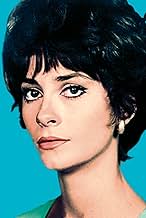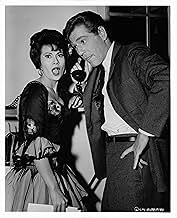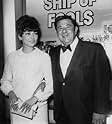AVALIAÇÃO DA IMDb
7,0/10
7,4 mil
SUA AVALIAÇÃO
Um grupo variado de passageiros de um navio com destino à Alemanha de pouco antes da Segunda Guerra representa um microcosmo da sociedade dos início dos anos 30.Um grupo variado de passageiros de um navio com destino à Alemanha de pouco antes da Segunda Guerra representa um microcosmo da sociedade dos início dos anos 30.Um grupo variado de passageiros de um navio com destino à Alemanha de pouco antes da Segunda Guerra representa um microcosmo da sociedade dos início dos anos 30.
- Direção
- Roteiristas
- Artistas
- Ganhou 2 Oscars
- 5 vitórias e 13 indicações no total
José Ferrer
- Siegfried Rieber
- (as Jose Ferrer)
José Greco
- Pepe
- (as Jose Greco)
Heinz Rühmann
- Julius Löwenthal
- (as Heinz Ruehmann)
- Direção
- Roteiristas
- Elenco e equipe completos
- Produção, bilheteria e muito mais no IMDbPro
Avaliações em destaque
Vivien Leigh sits opposite redneck Lee Marvin in the ship's upper deck restaurant, Marvin confesses to Leigh he never new what a Jew was until he was 15, "You were too busy lynching blacks" is her replay. I thought to mention it just to give you a hint of the sort of cruise ship we're travelling on. We sail through a sea that goes from the sublime to the ridiculous. Abby Mann is a master at drawing characters with long shadows and Kramer a master at capturing them. Think "Judgement at Neuremberg" Here you'll feel sea sick sometimes but the trip is worth taking. I mean. Vivien Leigh and Lee Marvin in a sad comedy of errors. Simone Signoret as a drug addicted countess and Oskar Werner her kindly, tragic, doctor, pusher. Highly charged, beautifully written moments. The lower decks for the down trodden is full of extras. George Segal and Elizabeth Ashley try both decks and and a deck all their own with melodramatic regularity. Jose Ferrer and Heinz Rhumman have one of my favourite exchanges. Ferrer, the German military tells Rhumman, the German Jew, that he should admit that the Jews are great part of the German problem. Rhumman calmly agrees and ads "true, but not only the Jews, also men who smoke the pipe are great part of the German problem" "Why men who smoke the pipe?" Shouts Ferrer. To what Rhumman replies "Why the Jews?" Michael Dunn addresses us directly, asking us to find ourselves among the passengers. Okay.
Ship of Fools (1965) directed by Stanley Kramer, is based on the novel by Katherine Anne Porter. The film is a reasonably faithful cinematic adaptation, although it lacks the novel's subtlety and complexity. Director Kramer assembled an all-star cast--including Vivien Leigh (her last film), Simone Signoret, José Ferrer, Lee Marvin, Oskar Werner, José Greco, and George Segal.
The film takes place entirely on shipboard, except for the final scene. Naturally, the close confines of the ship and the lack of privacy bring about forced interactions, as would have been the case in reality. These interactions form the basic plot of both the book and the film.
The time is 1933, so the passengers don't know what we know--things are changing rapidly in Germany and everything will be different in just a year or two. In fact, that's the basic weakness of the plot--it's easy in retrospect to know just how wrong the Jewish salesman is when he assures people that the current unpleasantness will blow over and all will be well.
Some features of the novel were unfortunately omitted from the film, especially the roles of the Spanish twins, Ric and Rac. In the novel, they are the embodiments of senseless evil, and every chapter in which they appear is laden with foreboding. In the film, the children commit one evil act, but it makes no sense because we haven't been prepared for it.
Director Kramer made one choice I consider foolish. In the novel, a young woman named Elsa Lutz is realistically unhappy. She is unattractive, not very intelligent, not gifted or graceful, and her prospects for marriage are bleak. In the film, she is portrayed as a stunning ingénue, who will blossom into an even more stunning woman. No dramatic tension there. Porter had it right, Kramer had it wrong.
All in all, "Ship of Fools" is a classic movie by an excellent director and it's loaded with stars. It's not an essential film, but it's entertaining enough and worth renting.
The film takes place entirely on shipboard, except for the final scene. Naturally, the close confines of the ship and the lack of privacy bring about forced interactions, as would have been the case in reality. These interactions form the basic plot of both the book and the film.
The time is 1933, so the passengers don't know what we know--things are changing rapidly in Germany and everything will be different in just a year or two. In fact, that's the basic weakness of the plot--it's easy in retrospect to know just how wrong the Jewish salesman is when he assures people that the current unpleasantness will blow over and all will be well.
Some features of the novel were unfortunately omitted from the film, especially the roles of the Spanish twins, Ric and Rac. In the novel, they are the embodiments of senseless evil, and every chapter in which they appear is laden with foreboding. In the film, the children commit one evil act, but it makes no sense because we haven't been prepared for it.
Director Kramer made one choice I consider foolish. In the novel, a young woman named Elsa Lutz is realistically unhappy. She is unattractive, not very intelligent, not gifted or graceful, and her prospects for marriage are bleak. In the film, she is portrayed as a stunning ingénue, who will blossom into an even more stunning woman. No dramatic tension there. Porter had it right, Kramer had it wrong.
All in all, "Ship of Fools" is a classic movie by an excellent director and it's loaded with stars. It's not an essential film, but it's entertaining enough and worth renting.
A grim long voyage with an earnest script by the remarkable Abby Mann and a respectful Stanley Kramer at the helm. Assorted desperate characters makes the sailing a gripping one. When the extraordinary Simone Signoret, Oskar Werner and Vivien Leigh are on, we're there with them one hundred per cent. Simone Signoret's addicted Countess and Vivien Leigh's bitter and disillusioned middle age Southern woman touch and dominate the highest, most powerful moments. Their stories have an immediate resonance and their faces, wonderful, beautiful faces, carry a truth that is as pungent as it is undeniable. Painful yes, very painful but, as it happens with the best kind of drama, entertaining, compelling, cinematic. Jose Ferrer's German bore, George Segal and Elizabeth Ashley and even the wonderful Michael Dunn will make you sea sick at times but I will recommend it nonetheless just to admire and enjoy Vivien Leigh's Charleston or Simone Signoret looking at Oskar Werner with a mixture of love, lust, compassion and need. For collectors of imperfect gems.
Abby Mann, who also wrote 'Judgement at Nuremburg' for director Stanley Kramer, has here condensed the novel of Katherine Anne Porter to a little under two and a half hours but it still seems a wee bit on the long side. The weakest link is the on/off romance of the angst-ridden artist of George Segal and the insecure girlfriend of Elisabeth Ashley which becomes rather tiresome. The strongest link is the relationship between ship's doctor Schumann and La Condesa. Oskar Werner and Simone Signoret are simply stupendous and their chemistry is palpable. They are greatly aided by having beautifully written roles and the touching music of Ernest Gold. Werner received recognition for his performance from the New York Critic's Circle. At one point she asks him 'Are you happy?' His response 'Who is?' has a world of meaning.
Mention has to be made of Vivien Leigh who plays a lady 'entre deux ages' as the French diplomatically say. Kramer paid tribute to her courage in taking on the role despite her physical and mental problems. Needless to say her nuanced performance oozes class. She picked up a well-deserved 'L'Etoile de Cristal' before this award was renamed the César.
Among the uniformly excellent performances is that of Heinz Ruemann as Lowenthal, an incorrigible optimist who has chosen to go back to Germany in 1932! When asked about his fellow German Jews he asks: 'What are they going to do, kill us all?' Ruemann's presence in this film is fascinating for although he always asserted that he was a fervent anti-Nazi he certainly had a close association with Hitler and his circle. The fact that he was one of Germany's most popular actors and was married to actress Hertha Feile who was quarter Jewish no doubt enabled him to seemlessly continue his career after the war.
Despite its longeurs this is a piece that leaves a deep impression as we can all relate to the guilts and regrets of these characters. In response to Schumann's 'I haven't lived' the Captain asks 'Who has?'
Sorry to say the author disliked the finished product but in the world of film adaptations that is par for the course!
Mention has to be made of Vivien Leigh who plays a lady 'entre deux ages' as the French diplomatically say. Kramer paid tribute to her courage in taking on the role despite her physical and mental problems. Needless to say her nuanced performance oozes class. She picked up a well-deserved 'L'Etoile de Cristal' before this award was renamed the César.
Among the uniformly excellent performances is that of Heinz Ruemann as Lowenthal, an incorrigible optimist who has chosen to go back to Germany in 1932! When asked about his fellow German Jews he asks: 'What are they going to do, kill us all?' Ruemann's presence in this film is fascinating for although he always asserted that he was a fervent anti-Nazi he certainly had a close association with Hitler and his circle. The fact that he was one of Germany's most popular actors and was married to actress Hertha Feile who was quarter Jewish no doubt enabled him to seemlessly continue his career after the war.
Despite its longeurs this is a piece that leaves a deep impression as we can all relate to the guilts and regrets of these characters. In response to Schumann's 'I haven't lived' the Captain asks 'Who has?'
Sorry to say the author disliked the finished product but in the world of film adaptations that is par for the course!
One of my favorite indulges over the years has been "Ship of Fools," a 1965 glossy, episodic entertainment done strictly grand scale. Based on Katherine Anne Porter's epic novel, the Oscar-nominated "Best Picture" centers on a sundry group of travelers circa 1933 who clash "Grand Hotel" style on a German ocean liner bound, via Mexico, for Germany (and impending doom it would seem) just as strong Nazi sentiment was breeding. The ship becomes a microcosm of pre-WWII life and mores, with a plethora of subplots alternately swelling and ebbing throughout - situations that alter the course of some of its passengers and crew members, for better or worse.
From the clever opening collage of credits (don't miss this part) set to a catchy, flavorful Latin score to its fascinating all-star disembarkation at the end, it's smooth sailing for most of this trip, guided with an assured hand by the always capable Stanley ("Judgment at Nuremberg") Kramer, with certain cast members (Simone Signoret, Oskar Werner, Vivien Leigh, Lee Marvin, Michael Dunn) coming off better than others (José Ferrer, Elizabeth Ashley, George Segal).
A number of compelling vignettes acted out by the choice, eclectic ensemble make up for the sometimes turgid melodramatics that occur on board as our "ship of fools" are forced to examine their own pride and prejudice while victimized by others. Who can forget the tormented Simone Signoret and Oskar Werner (both Oscar-nominated) as the morphine-addicted political prisoner and dutiful ship's physician who provide the film with its most poignant and tragic shipboard romance. Their clandestine encounters are exquisitely written and beautifully realized. Or Vivien Leigh's coy, aging elitist, Mary Treadwell, who delivers a brilliantly despairing monologue in front of a makeup mirror that, in turn, sets up a wildly climactic shoe-bashing scene with Lee Marvin's besotted baseballer when he viciously assaults, then profusely apologizes to the now-humiliated matron after mistaking her in the dark for a cooch dancer. Or José Greco & company's steamy, frenetic flamenco sequence during a raucous, after-hours party. Or dwarf actor Michael Dunn's sublime Greek Chorus that effectively bookends the movie (the Oscar-nominated Dunn subsequently played evil Dr. Loveless on TV's "Wild, Wild West" series). These glorious scenes and more help to balance out the less serviceable ones, particularly those involving Jose Ferrer's boisterous, irritating Nazi bigot who borders on caricature, and Elizabeth Ashley and George Segal's turbulent lovers who come off dull and forced.
Ernest Laszlo's lustrous black-and-white cinematography was suitably Oscar awarded, while the whole look, feel and tone of the movie is decidedly old-style theatre at its best. This movie has remained one of my all-time favorite wallows.
From the clever opening collage of credits (don't miss this part) set to a catchy, flavorful Latin score to its fascinating all-star disembarkation at the end, it's smooth sailing for most of this trip, guided with an assured hand by the always capable Stanley ("Judgment at Nuremberg") Kramer, with certain cast members (Simone Signoret, Oskar Werner, Vivien Leigh, Lee Marvin, Michael Dunn) coming off better than others (José Ferrer, Elizabeth Ashley, George Segal).
A number of compelling vignettes acted out by the choice, eclectic ensemble make up for the sometimes turgid melodramatics that occur on board as our "ship of fools" are forced to examine their own pride and prejudice while victimized by others. Who can forget the tormented Simone Signoret and Oskar Werner (both Oscar-nominated) as the morphine-addicted political prisoner and dutiful ship's physician who provide the film with its most poignant and tragic shipboard romance. Their clandestine encounters are exquisitely written and beautifully realized. Or Vivien Leigh's coy, aging elitist, Mary Treadwell, who delivers a brilliantly despairing monologue in front of a makeup mirror that, in turn, sets up a wildly climactic shoe-bashing scene with Lee Marvin's besotted baseballer when he viciously assaults, then profusely apologizes to the now-humiliated matron after mistaking her in the dark for a cooch dancer. Or José Greco & company's steamy, frenetic flamenco sequence during a raucous, after-hours party. Or dwarf actor Michael Dunn's sublime Greek Chorus that effectively bookends the movie (the Oscar-nominated Dunn subsequently played evil Dr. Loveless on TV's "Wild, Wild West" series). These glorious scenes and more help to balance out the less serviceable ones, particularly those involving Jose Ferrer's boisterous, irritating Nazi bigot who borders on caricature, and Elizabeth Ashley and George Segal's turbulent lovers who come off dull and forced.
Ernest Laszlo's lustrous black-and-white cinematography was suitably Oscar awarded, while the whole look, feel and tone of the movie is decidedly old-style theatre at its best. This movie has remained one of my all-time favorite wallows.
Você sabia?
- CuriosidadesVivien Leigh was subject to bouts of depression and alcoholism and was abrasive to fellow actors. There was a rocky start to her relationship with Lee Marvin, complaining about his stale alcohol breath. Eventually, the two became highly unlikely good friends.
- Erros de gravaçãoAlthough set in 1933, the hairstyles and costumes are decidedly mid-1960s.
- ConexõesEdited into Spisok korabley (2008)
Principais escolhas
Faça login para avaliar e ver a lista de recomendações personalizadas
- How long is Ship of Fools?Fornecido pela Alexa
Detalhes
Bilheteria
- Orçamento
- US$ 4.000.000 (estimativa)
- Faturamento bruto mundial
- US$ 206
- Tempo de duração2 horas 29 minutos
- Cor
- Mixagem de som
- Proporção
- 1.85 : 1
Contribua para esta página
Sugerir uma alteração ou adicionar conteúdo ausente

Principal brecha
By what name was A Nau dos Insensatos (1965) officially released in India in English?
Responda



























